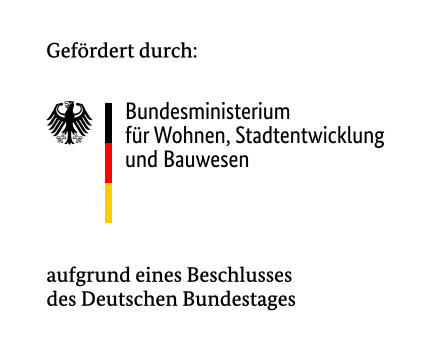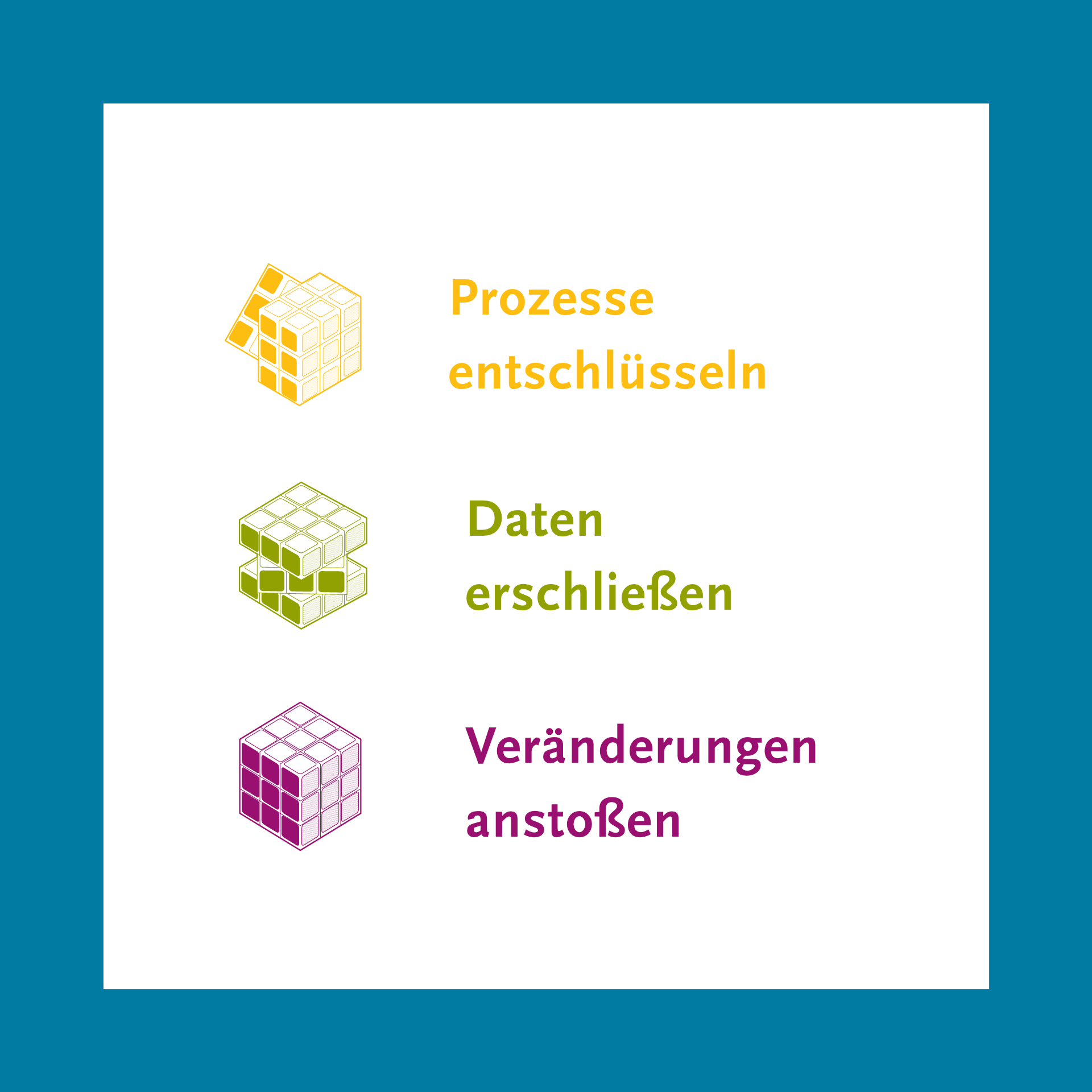
Data & Smart City Governance: Using the Example of Air Quality Management
Rapid urbanisation poses enormous challenges for cities like Berlin. Data-driven urban measures could be one way to effectively address challenges such as climate neutrality, mobility transition or administrative modernisation. However, the use of data raises a number of questions: Who has access to what data? For what purposes and under what conditions can it be used? What technologies are used to collect, store and process data? What organisational structures set the parameters for data processing?
The aim of the project is to develop a data governance concept that addresses these questions using the example of a data-driven tool for monitoring air quality (air quality management) in Berlin. The concept aims to enable public administrations, economic actors and civil society to cooperate in the use and processing of data in a way that is oriented towards the common good.
Data & Smart City Governance: using the example of air quality management is a pilot measure of the strategy Gemeinsam Digital: Berlin.
Research background and questions
Involvement of various stakeholders
In order to take the different interests into account, our project brings together people from public administration, business, civil society and politics. In a multi-stage participation process, we discuss their concerns regarding the collection and (re)processing of digital data. In this way, we aim to identify and resolve potential conflicts at an early stage. As part of our data governance approach, participation is intended to help manage the tension between democratic processes, the responsibilities and capabilities of government, and the civil liberties of all stakeholders.
The interactive exhibition and subsequent discussion focused on the question: How should citizen participation ideally be designed, especially when an administration is planning measures based on data-driven calculations that affect the daily lives of urban actors in various ways?
Science + Civil Society
25 November 2023, at CityLab Berlin
At this public event, experts from government, research and business discussed the opportunities and obstacles of data-driven government. Then the discussion was opened up to the public.
Science + Administration + Economy + Public
28 June 2023, at Hub Berlin
Preliminary results
The results of our ongoing research are the result of the constant comparison of theoretical approaches with the practical application of the project: measures for monitoring air quality (air quality management) in the urban area of Berlin using data-driven tools. The requirements for a data-driven administration are based on theoretical concepts of data governance. In addition, opportunities for participation will be mapped out, as this is a key element in resolving conflicts of interest within data governance. The results will be further developed based on the use case. For this purpose, the use of data in air quality improvement measures will be investigated and new methods of data modelling in the context of multi-level participation will be tested.
 | What are the requirements for data-driven administration?There are several normative and organisational requirements that the administration must take into account when making decisions based on data. This text summarises these requirements and outlines ways to implement data-driven projects. |
 | What models for data sharing can be adopted by the administration?The implementation of innovative digital and data-driven services is often hampered by uncertainty. It is unclear who has access to what data, from whom, and under what conditions it can be used and re-used. Public administrations typically work with three different data sharing models: proprietary models, open data models and, increasingly, data commons models. This paper describes each model with a brief overview of its advantages and disadvantages. |
 | What difficulties have arised so far in the use of the data?In a workshop with the Berlin administration and academics, the evaluation and decision-making criteria as well as the opportunities and risks of the different data models were identified and discussed. The following workshop documentation provides an overview of the results of the dialogue. |
 | How should dashboards be designed to increase the transparency of data-driven measures?Smart city dashboards enable complex data to be presented in a transparent and easily understandable way, making decisions simpler and more comprehensible for the administration, the public and other stakeholders. The checklist highlights how dashboards need to be developed and designed in order to achieve this. |
 | Which types of participation models are there?There are many different forms of stakeholder participation. They are used in different ways, depending on the area and objective, to involve the relevant stakeholders (e.g. public administration, businesses and citizens) in development or decision-making processes. The following participation matrix provides an overview of participation in different disciplines. |
 | Public participation in administrative processesPublic administrations are increasingly turning to informal forms of public participation. Although this often involves significant additional effort and can present additional challenges, this form of participation - especially in data-driven projects - offers many opportunities for the common good of our society. |
 | Using and expanding formal public participationInvolving the public in the planning and implementation of data-driven policies is often recommended. In some cases this is a legal requirement. This formal participation should be actively encouraged, particularly in data-driven projects, and complemented by informal formats where appropriate. |
 | Testing the participation proposalsThe results of the paper Public participation in data-driven administrations were directly integrated into an interactive research setting for citizen participation in data-driven projects. As part of a multimedia exhibition that structurally reproduces the process of traffic planning measures, the project team tested how conflicts of interest can be resolved by formal participation in an administrative process or whether this participation can be meaningfully supplemented. |
 | Which transport measures to improve air quality are decided on which legal basis?Different measures are adopted on different legal bases. An overview of the legal basis allows an assessment of how and with what effort a measure can be implemented and which actors are affected by the measure. Of particular interest to us is What data can or must be used to comply with the legal basis? |
 | How are transport measures to improve air quality implemented?Based on the legal basis and existing examples where measures have been implemented, we were able to outline the administrative process of three selected transport measures (parking management, neighbourhood blocks, climate-neutral traffic zone). The purpose of documenting the processes was to determine when and in what form public participation is planned, and whether this formal participation could sufficiently address conflicts of interest caused by data. |
 | Which transport measure has which impact on traffic emissions?Answering this question requires complex data modelling, usually carried out by private stakeholders. By developing a dashboard that visualises the modelled data, we were able to identify the barriers between business and government in collaborating on technical solutions. In addition, a dashboard provides valuable support for data-driven decision making by providing a visual representation of complex issues and, when published, can provide transparency to the public. |
 Alexandra AuerAssociated researcher: New Technologies and Future of Law
Alexandra AuerAssociated researcher: New Technologies and Future of Law Maurice Stenzel, Dr.Senior researcher: New Technologies and Future of Law
Maurice Stenzel, Dr.Senior researcher: New Technologies and Future of Law Maximilian von Grafenstein, Prof. Dr.Associated Researcher: New Technologies and Future of Law
Maximilian von Grafenstein, Prof. Dr.Associated Researcher: New Technologies and Future of Law
Kompetenzzentrum Wasser Berlin
RSUP
-
 Lea ReetzFormer Student Assistant: Data, Actors, Infrastructures
Lea ReetzFormer Student Assistant: Data, Actors, Infrastructures -
 Luisa KruseFormer Researcher: Data & Smart City Governance
Luisa KruseFormer Researcher: Data & Smart City Governance -
 Marcus Joseph Schweinberg, RAFormer researcher: Data, Actors, Infrastructures
Marcus Joseph Schweinberg, RAFormer researcher: Data, Actors, Infrastructures
Journal articles and conference proceedings
Stenzel, M., & von Grafenstein, M. (2025). Data Governance als Baustein der digitalen Transformation. Innovative Verwaltung, 21(12). Publication details
Working paper
Kruse, L., Auer, A., & Stenzel, M. (2025). Kommunaler Umwelt-, Klima- und Gesundheitsschutz durch Verkehrswende? Eine Analyse der bestehenden rechtlichen Rahmenbedingungen und Empfehlungen zur Anpassung unter besonderem Fokus auf der digitalen Kontrolle des Parkraums. HIIG Discussion Paper Series, 2025(1). DOI: 10.2139/ssrn.5288983 Publication details
Grafenstein, M. (2023). The New Hanse: Data sharing between public and private actors in the public interest – A first legal assessment toward a legal blueprint. The New Hanse Report. Publication details
de Macedo Schäfer, N., Schweinberg, M. J., Stenzel, M., & von Grafenstein, M. (2023). Data Governance im Spannungsfeld datengetriebener Verwaltung. Herausforderungen von Kommunen bei der Etablierung einer Smart City Administration. HIIG Discussion Paper Series, 2023(4). DOI: 10.5281/zenodo.8297607 Publication details
Auer, A., von Grafenstein, M., Kruse, L. & de Macedo Schäfer, N. (2023). Öffentlichkeitsbeteiligung in der datengetriebenen Verwaltung. Ein prozessbezogener Ansatz zur Lösung datenbezogener Interessenkonflikte durch die Ergänzung formeller Beteiligung. HIIG Discussion Paper Series, 2023(5). DOI: 10.2139/ssrn.4603704 Publication details
Bria, F., Blankertz, A., Fernández-Monge, F., Gelhaar, J., Grafenstein, M. v., Haase, A., Kattel, R., Otto, B., Sagarra Pascual, O., & Rackow, L. (2023). Governing Urban Data for the Public Interest. The New Hanse Project Blueprint. Publication details
Other publications
Stenzel, M., & von Grafenstein, M. (2025). Warum Daten- und Digitalisierungsprojekte in Kommunen scheitern – und wie man sie mit Data Governance zum Erfolg führt. Der Landkreis – Zeitschrift für Kommunale Selbstverwaltung (7/8). Publication details
Stenzel, M., & von Grafenstein, M. (2025). Der Data Governance Wegweiser: Schlüssel für die digitale Transformation in den Kommunen. Kommune21 (9). Publication details
Auer, A. & Stenzel, M. (2024). Beteiligung in der Smart City. Digital society blog. Publication details
Stenzel, M. & Auer, A. (2024). Verkehrswende im Kiez: Simulation einer Bürger*innen-Beteiligung in Berlins digitaler Verwaltung. Digital society blog. Publication details
Grafenstein, M. v. (2023). „Es muss ein Primat der Demokratie über Technologie und Geschäftsmodell geben.“ Ein Gespräch mit Paul Nemitz. TE.MA. Publication details
Lectures and presentations
Digital Transformation for Regional Integration: Dialogue on Innovation, Data Policy and Governance. Alexander von Humboldt Institut für Internet und Gesellschaft, Gesellschaft für Internationale Zusammenarbeit. HIIG, Berlin, Germany: 02.12.2025Maurice Stenzel, Daniel Pothmann, Sarah Spitz
Zwischen Stakeholder-Interessen und Gemeinwohl: Data Governance in der Smart CityAktuelle Entwicklungen in der Digitalpolitik. Freie Universität Berlin / Wissenschaftszentrum Berlin für Sozialforschung. Wissenschaftszentrum Berlin für Sozialforschung, Berlin, Germany: 27.11.2025
Maurice Stenzel
Raus aus dem Digitalisierungsstau: Data Governance für die Smart CitySmart Country Convention. Bundesministerium für Wohnen, Stadtentwicklung und Bauwesen, BitKom e.V.. hub27, Messe Berlin, Berlin, Germany: 02.10.2025 Further information
Maurice Stenzel
Data Governance Wegweiser – Das digitale Tool für die Auflösung des DigitalisierungsstausFachtag Datenschutz 2025. Kommunales Bildungswerk e.V.. ABACUS Tierpark Hotel, Berlin, Germany: 11.09.2025 Further information
Max von Grafenstein
Vorstellung des Data Governance Wegweisers zur praxisnahen und skalierbaren Data GovernancePeer2Peer-Netzwerk Data & Software Governance der Datenlabore der Bundesministerien. PD – Berater der öffentlichen Hand & Bundesministerium des Inneren. Online, Berlin, Germany: 29.08.2025
Maurice Stenzel, Max von Grafenstein
Vorstellung des Data Governance Wegweisers zur praxisnahen und skalierbaren Data GovernanceKompetenzteam „Data Governance“. IT-Planungsrat. Online, Berlin, Germany: 24.07.2025
Maurice Stenzel, Max von Grafenstein
Daten allein machen keine Smart City: Warum datengetriebene Projekte in Städten häufig scheiternLange Nacht der Wissenschaften. HIIG, Berlin, Germany: 28.06.2025 Further information
Maurice Stenzel
Smart City kurz und knackig: Das Data Governance-Handbuch vorgestelltSmart City kurz und knackig: Das Data Governance-Handbuch vorgestellt. Berlin Partner für Wirtschaft und Technologie. Berlin Partner für Wirtschaft und Technologie, Berlin, Germany: 24.06.2025
Maurice Stenzel, Alexandra Auer
Der Data Governance Wegweiser – Das digitale Tool für praktisch anwendbare Data Governance12. Arbeitstreffen der Themengruppe Data Governance (AEG Urbane Datenplattformen der Modellprojekte Smart Cities). AEG Urbane Datenplattformen der Modellprojekte Smart Cities. Online, Berlin, Germany: 27.05.2025
Maurice Stenzel, Alexandra Auer
Zwischen Stakeholder-Interessen und Datennutzen: Data Governance für das GemeinwohlCivic Data Camp. Civic Data Lab. Internationales Caritas-Zentrum, Cologne, Germany: 22.05.2025 Further information
Maurice Stenzel
Vorstellung des Data Governance Wegweisers6. Kongress der Modellprojekte Smart Cities. Bundesministerium für Wohnen, Stadtentwicklung und Bauwesen. Munich Urban Colab, Munich, Germany: 06.05.2025 Further information
Maurice Stenzel, Alexandra Auer, Max von Grafenstein
Data Governance in the Smart City – Reconciling conflicting interests in data-driven urban transformation for the common good1. Urban Digital Twins for a Sustainable Transformation of Cities Conference. HafenCity Universität & Connected Urban Twins (CUT) project. HafenCity Universität, City Science Lab, Hamburg, Germany: 02.04.2025 Further information
Maurice Stenzel, Alexandra Auer
Data & Smart City Governance: Impulse für Digitale ZwillingeBMDV-Fachforum 2 "Data-Governance-Prozesse für Digitale Zwillinge". Bundesministerium für Digitales und Verkehr. Online, Berlin, Germany: 10.12.2024 Further information
Maurice Stenzel
Datenteilen trotz Geschäftsgeheimnissen. Vorstellung der Ergebnisse der Data Governance-Studie im Reallabor Antrieb 4.09. Quartalstreffen im Reallabor Antrieb 4.0. Forschungsvereinigung Elektrotechnik beim ZVEI e.V. gefördert durch das Bundesministerium für Wirtschaft und Klimaschutz. Online, Berlin, Germany: 05.12.2024
Max von Grafenstein, Maurice Stenzel
Smart Data Governance. Der digitale Leitfaden für die datengetriebene VerwaltungSmart Country Convention – Digitales Berlin. Bitkom e.V.. hub27, Messe Berlin, Berlin, Germany: 16.10.2024
Max von Grafenstein
Data & Smart City Governance. Digitales Handbuch für die wirksame datengetriebene Verwaltung16. Start-Smart-Themenwerkstatt: Smart Cities befähigen – Data Governance als Schlüssel zur datensicheren Verwaltung. Koordinierungs- und Transferstelle Modellprojekte Smart Cities (KTS). Online, Online, Online: 28.06.2024 Further information
Maurice Stenzel, Alexandra Auer
Data & Smart City Governance. Digitales Handbuch für die wirksame datengetriebene Verwaltung. Themengruppe Data Governance (AEG Urbane Datenplattformen der Modellprojekte Smart Cities). 8. Arbeitstreffen, Online, Online: 25.06.2024Maurice Stenzel
Governing data through participation. Insights from the use case of air quality management in BerlinGoverning Smart Cities. Humboldt Institut für Internet und Gesellschaft, Berlin, Germany: 14.05.2024
Maurice Stenzel
Data & Smart City Governance am Beispiel von LuftgütemanagementSmart Country Convention. Digitalverband Bitkom, Messe Berlin. hub27, Messe Berlin, Berlin, Germany: 09.11.2023 Further information
Maurice Stenzel
Data & Smart City Governance – Datengetriebene Daseinsvorsorge gemeinwohlorientiert realisieren9. Zukunftskongress Staat & Verwaltung. Wegweiser Media & Conferences GmbH. WECC - Westhafen Event & Convention Center, Berlin, Germany: 19.06.2023 Further information
Alexandra Auer, Maurice Stenzel
Data and Smart City Governance. The importance of multi stakeholder processes and citizen participationJoint Master in Global Economic Governance & Public Affairs: Digitalisation for Sustainable Development. Centre International de Formation Européenne. Centre International de Formation Européenne, Berlin, Germany: 20.03.2023
Alexandra Auer, Lea Reetz
Panels
Deutschland, Deine Daten - Datenschutz, Regulierungen und Open Data in neuen politischen Blickwinkeln?11. Zukunftskongress Staat & Verwaltung. Wegweiser Media & Conferences GmbH. WECC - Westhafen Event & Convention Center, Berlin, Germany: 24.06.2025 Further information
Maurice Stenzel
Moderation of workshops and panels
Wie kann der digitale Leitfaden für Data & Smart City Governance die datengetriebene Verwaltung unterstützen?5. Kongress der Modellprojekte Smart Cities 2024. Bundesministerium für Wohnen, Stadtentwicklung und Bauwesen. KOMED Köln, Cologne, Germany: 20.11.2024 Further information
Maurice Stenzel, Alexandra Auer, Max von Grafenstein
Organisation of events
Stadt, Daten, Strategie: Erfolgreich in die datengetriebene Verwaltung. Workshop im Rahmen des KTS Peer-Learning16.01.2026. Koordinations- und Transferstelle der Modellprojekte Smart Cities (online), Berlin, Germany. Co-Organised by: Koordinations- und Transferstelle der Modellprojekte Smart Cities (National)
Maurice Stenzel, Alexandra Auer
Wie können Städte mit Daten bessere Entscheidungen treffen?CityLAB Sommerkonferenz 2025. 18.06.2025. Umweltforum Berlin, Berlin, Germany (National) Further information
Alexandra Auer, Maurice Stenzel
Data & Smart City Governance am Beispiel von Luftgütemanagement – Workshop zum Projektabschluss11.06.2025. Humboldt Institut für Internet und Gesellschaft, Berlin, Germany (National)
Alexandra Auer, Maurice Stenzel, Maximilian von Grafenstein
Der Data Governance Wegweiser – Das digitale Tool für praktisch anwendbare Data GovernanceCivic Data Camp. 22.05.2025. Internationales Caritas-Zentrum, Cologne, Germany (National) Further information
Maurice Stenzel
Mit Data Governance den Digitalisierungsstau in deutschen Kommunen auflösen (II)20.05.2025. Online, Berlin, Germany (National) Further information
Alexandra Auer, Maurice Stenzel, Maximilian von Grafenstein
Mit Data Governance den Digitalisierungsstau in deutschen Kommunen auflösen (I)14.05.2025. Online, Berlin, Germany (National) Further information
Alexandra Auer, Maurice Stenzel, Maximilian von Grafenstein
Digital Governance and Data Policy27.09.2024. Humboldt Institut für Internet und Gesellschaft, Berlin, Germany (International)
Maurice Stenzel, Sarah Spitz, Sonja Köhne, Jörg Pohle
Datenteilen unter Wahrung von Geschäftsgeheimnissen11.06.2024. Berlin Partner für Wirtschaft und Technologie, Berlin, Germany (National) Further information
Maurice Stenzel, Maximilian von Grafenstein
Reallabor Bürger*innen-Beteiligung: Bessere Luft durch Verkehrswende?25.11.2023. CityLAB Berlin, Berlin, Germany (National) Further information
Luisa Kruse, Alexandra Auer, Maurice Stenzel, Maximilian von Grafenstein
Data Governance in Smart Cities in Post-COVID-19 Times24.10.2023. Humboldt Institute for Internet and Society, Berlin, Germany (International)
Jörg Pohle
Öffentlichkeitsbeteiligung in der dategentetriebenen Verwaltung23.10.2023. Humboldt Institut für Internet und Gesellschaft, Berlin, Germany (National)
Luisa Kruse, Alexandra Auer, Maurice Stenzel, Maximilian von Grafenstein
Expert*innen-Dialog: “Datenmodelle in der Verwaltungspraxis: Abwägungskriterien für Entscheidungsprozesse der datengetriebenen Verwaltung”08.09.2023. Humboldt Institut für Internet und Gesellschaft, Berlin, Germany (National) Further information
Maurice Stenzel
Digitaler Salon: Großbaustelle Daten. Byte für Byte zur Smart City28.06.2023. STATION Berlin, Berlin, Germany (National) Further information
Alexandra Auer, Maurice Stenzel
2. Steuerungsrunde “Data & Smart City Governance am Beispiel von Luftgütemanagement” / Gemeinsam Digital: Berlin08.06.2023. Humboldt Institut für Internet und Gesellschaft, Berlin, Germany (National)
Maurice Stenzel
-
eGovernment – Verwaltung Digital
Data Governance: ein Leitfaden für die Praxis
-
Tagesspiegel Background Smart City
Data Governance Wegweiser soll Kommunen bei Datenstrategie helfen
-
Deutschlandfunk
Smart Cities: Neuer Wegweiser hilft Kommunen beim Daten-Management
Förderungen und Kooperationen
The project is funded by the Governing Mayor of Berlin - Senate Chancellery - with support from the Federal Ministry of Housing, Urban Development and Construction and the Kreditanstalt für Wiederaufbau.


![]()
The content coordination and scientific research is carried out in cooperation with the Berlin Centre of Competence for Water.
Contact:
Nikolaus de Macedo Schäfer (Researcher)
Nicolas Caradot (Project Leader Smart City & Infrastructure)

| Duration | 06/2022 – 03/2025 |



